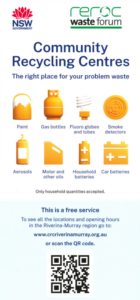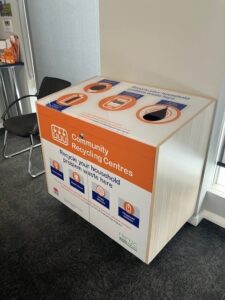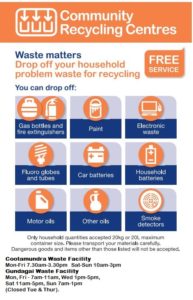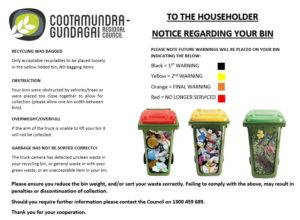Pollution Incident Response Management Plan
Pollution-Incident-Response-Management-Plan-Waste-Depot.pdf
Lithium-Ion Battery Safety
A lithium-ion battery is an energy efficient rechargeable battery with high energy density, long cycle life and long shelf life.
Lithium-ion batteries are commonly used in:
* motor vehicles, e-bikes and e-scooters
* laptops, mobile phones, handheld game consoles, digital cameras, torches and toys
* medical instruments such as hearing aids, ECG monitors and dosage dispensers
* construction and maintenance
* industrial equipment such as forklifts and battery powered hand tools
* bulk energy storage facilities.
Risks of lithium-ion batteries
Lithium-ion batteries can pose health and safety risks that need to be managed effectively.
Fire and explosion hazard
Lithium-ion batteries have the potential to catch fire or explode if not handled, stored, or charged correctly. This can result in property damage, injuries, and even fatalities.
To read more about Lithium-ion Batteries click on the links below
Lithium-ion batteries | SafeWork NSW
Lithium-ion battery safety FACT SHEET-19082025151427
CONFUSED ABOUT DISPOSING HOUSEHOLD RUBBISH INTO THE CORRECT BIN?
Check out the What goes in What Bin! This comprehensive list will dispel the confusion on what goes where!!
REMEMBER RECYCLE RIGHT!
Visit your Community Recycling Centre and help build a healthy environment for our future.
Community Recycling Centres (crcriverinamurray.com.au)
Not all household waste can be put in your kerbside bins. Community Recycling Centres offer a FREE and easy solution for the disposal of household problem waste such as paints, gas bottles, motor oils, batteries, smoke detectors and fluorescent globes and tubes.
Many of these materials can be reused and recycled in processed correctly. Recycling helps our environment because it save water, energy and natural resources.
Only household quantities of these materials will be accepted. As a guide, this is a maximum container of 20 litres or 20 kilograms of each waste type.
Small items such as household batteries, fluoro globes and tubes, mobile phones and smoke detectors can also be dropped off at Council’s offices.


Single-Use Plastics Ban
Social Pinpoint | Plastics ban nsw (mysocialpinpoint.com.au)
NSWPlasticsBan_A4Poster_Colour
Domestic Waste Servics for Rural Residents
At the ordinary meeting of Council held on Tuesday 28 September 2021, Council has adopted the Domestic Rural Waste Initiatives put forward by the Manager Waste, Parks and Recreation Services. The initiative has been developed in response to rural community residents’ inquiries regarding free waste disposal and access to the Cootamundra-Gundagai Regional Council (CGRC) landfill sites for domestic waste.
By adopting the initiative, rural households will receive free access to their local landfill sites for the purpose of emptying a Council provided wheelie bin used solely for the purpose of disposing of household domestic waste.
Rural residents will need to apply to Council for the issue of one 240Lt bin per rural residential only (black bin with red lid) free of charge. The cost of bins be funded from the waste reserves. Bins will only be issued on formal application to CGRC, to enable all property details are recorded into Council’s waste management system. Each rateable property is limited to one bin only.
To apply for the Rural Domestic Waste Bin, please complete the form:
2022 Domestic Rural Waste Management Agreement
Village Transfer Station Upgrade – for the villages of Nangus, Tumblong, Coolac and Muttama .
Village transfer stations are undergoing an upgrade to access systems and security to provide a more efficient and user-friendly service to the community. Transfer stations in the villages of Nangus, Tumblong, Coolac and Muttama now have infrastructure installed to allow users to gain entry to the sites via an electronic tag.
The electronic entry system, combined with the installation of CCTV, will assist Council to monitor the sites more effectively and reduce the occurrence of illegal dumping in these areas resulting in a better service provided to users.
Authorised key holders can present their transfer station key to Council’s office at 255 Sheridan Street, Gundagai to obtain their electronic tag. To enable continuation of service users will retain the existing key until the new entry system is activated on Friday, 22 April 2022. Once the electronic system is active users are requested to return the original key to Council.
Residents of villages who do not currently have access and wish to apply for a tag can do so by completing an Application for Access to Transfer Station, providing proof of residential address and paying a key bond which is currently $50.00. Key bonds are fully refundable when access is no longer required, and the key is returned to Council.
Please ensure applications are received by Council prior to the new electronic entry system activation date of Friday, 22 April 2022 to ensure there is no interruption to this service.
Bin Notices Assist with Efficient Garbage Collection
Cootamundra-Gundagai Regional Council (CGRC), has implemented the notices, due to the contamination and overloading of bins and the difficulty being experienced by the collection crews and recycling teams in ensuring a productive and practical garbage disposal system is maintained.
Black Notice = First Warning. Yellow Notice = Second Warning. Orange Notice = Final Notice. Red Notice = No Longer Serviced.
Contamination of recyclable material is a problem experienced that Council is addressing. When a recycling bin is contaminated with incorrect items, the recycling process becomes less efficient and can result in valuable resources being sent to landfill rather than being reused or recycled. This causes both financial and environmental loss. Contamination makes the service more expensive, poses risks to workers hand sorting the materials and can result in truckloads of recycling or green waste being sent to landfill. Contamination can also be hazardous for workers at the Material Recovery Facility (MRF).
There can be some confusion associated with recycling. CGRC has put together a pack for interested community members to collect from Cootamundra and Gundagai Administration offices.
Contamination can cause all your recycling efforts go to waste below are some tips on the items that do not belong in your recycling bin.
Greasy Pizza Boxes, Take Away Food Containers. That brown, oily takeaway bag and cheese-crusted pizza boxes may seem like great additions to your recycling bins, but not if they are contaminated with food. If there is food or grease on it, it belongs in general waste.
Nappies. You’d be surprised at how many disposable nappies make their way to the recycling system. Not only are they not recyclable, the fact that they are soiled makes it unsanitary for workers who are hand sorting recyclables to deal with and contaminate other good quality materials in the bin. Opt for cloth nappies instead or put your disposable nappies in general waste.
Soft plastics. While most rigid plastic containers can be recycled, soft plastics do not belong in recycling bins as they can get caught in sorting machinery. A better option is to collect soft plastic separately and take them to a nearby supermarket that recycles soft plastic or better yet, avoid them altogether.
E-waste. Computers, mobile phones, printer cartridges and other electronic devices are considered e-waste and do not belong in your commingled recycling bin. Not only will it contaminate the general recycling stream, but it also contains hazardous materials that is a risk to anyone handling it incorrectly. To recycle unwanted electronics, FREE of charge, visit your Community Recycling Centres (CRCs) at Cootamundra and Gundagai.
For more information on FREE disposal of household problem waste see here – 
Used Tissues or Paper Towels. Soiled tissues, paper towels and serviettes are likely to have absorbed water and other unsanitary substances making them unsuitable for recycling.
*Food waste. Food waste such as fruits, vegetables, eggshells and bread are some of the biggest causes of recycling contamination in Australia. Food waste should be disposed of in the general waste bin for Cootamundra garbage collection services. Or start your own worm farm or compositing bin. * Food waste can be deposited in the Green Bin, for Gundagai garbage collection services only.
Crockery and Pyrex. Broken crockery and tempered cookware glass like Pyrex cannot be sorted through the Materials Recovery Facility (MRF) and should be kept out of the recycling bin. Crockery is also not accepted and should go in general waste instead.
Textiles. All clothing and fabric are considered contamination and are not accepted in the commingled recycling bin. Even worse, textiles can get tangled in sorting machinery and can cause damage.
Garden – Green Waste. Garden or green waste includes leaves, grass clippings, branches and flowers. They are considered contaminants in the Yellow recycling bin. Use the dedicated green waste bin if you have one. This allows your garden waste to be collected and recycled into compost or mulch. Do not place plastics of any kind, string or metal objects in this bin.
Bagged Recyclables. Recycling should always be loose in your recycling bin. Because plastic bags cannot be processed at sorting facilities, this means the entire bag of otherwise good quality recycling will go to waste.
Contaminated or Dirty Recyclables. To ensure the safety of workers who are hand sorting in the MRF, residents are asked to wash out bottles, jars and plastic bottles before depositing into the recycling bin. This reduces odour and bacterial growth and helps make the recycling process more efficient at the recycling plant.
The notices will also advise residents that overloading of bins and having obstructions that don’t allow the truck to successfully grab the bin will result in warning stickers being attached to the residents bin.CGRC Garbage Trucks are fitted with cameras and detection units to identify contamination from individual household bins.
Council is committed to delivering effective and efficient service to all residents, including the townships of Cootamundra and Gundagai, the villages in the municipality and the rural landholders.
CGRC is striving to have effective and efficient garbage removal, recycling and reducing landfill and other associated costs with residential rubbish removal.

